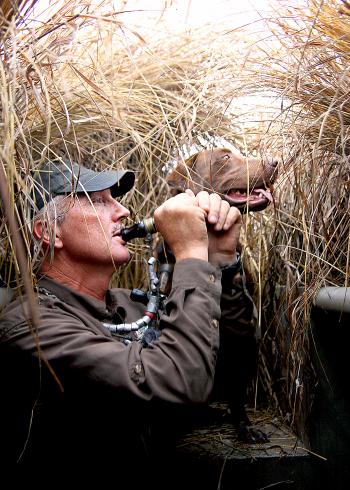
Jude Zaunbrecher is farm manager and head guide at the Lacassine Club and like many southwest Louisiana waterfowl hunters is an excellent speck caller. (Submitted Photo/Courtesy of John K. Flores)
Waterfowl hunters shouldn’t go into withdrawals yet
Waterfowl hunters are a peculiar bunch. Perhaps only tournament bass anglers rival them when it comes to being fanatical about their respective endeavors. And though we’re not talking apples to apples when it comes to fins and feathers, from an emotional aspect we are, when it comes to being passionate about these pursuits.
One difference for the waterfowl hunter is the fact there is a specific season to what the hunter does, and it’s over.
The bass angler may see the bite slow down some months during the year, but it’s never over in the Sportsman’s Paradise.
By contrast, there seems to be a certain finality surrounding the third weekend in January for coastal duck hunters, where emotionally a period of withdrawals occurs.
For St. Mary Parish duck hunters, those withdrawals start after this weekend — at sunset on Jan. 19, to be exact. But, before putting your Labrador retriever on unemployment and swapping your shotgun for a fishing pole, why not extend your season with a southwest Louisiana goose hunt?
During the 2013 Southeastern Outdoor Press Association’s annual conference in Lake Charles, I had the opportunity to sign up for one of the media excursions that showcased our grand state sponsored by the Lake Charles/Southwest Louisiana Convention and Visitors Bureau.
Through the bureau, I was connected with Sammy Faulk, owner operator of Gotta Go Charters.
And through Faulk, I connected with Jude Zaunbrecher, farm operations manager for the Lacassane Co. and head guide for the Lacassane Club.
Zaunbrecher reminds you of a character right out of an old western movie or Louis L’Amore novel. Standing 6-feet, 3 inches tall and weighing 210 pounds, the 54-year-old guide has those slight weathered features that go with a man who works outside.
Zaunbrecher is also someone who displays a confident, pleasant demeanor, something that’s necessary to ensure guest hunters not only get the opportunity to harvest a few geese but also have a good time while doing it.
Though my hunt with Zaunbrecher was at the beginning of the season way back in mid-November, the club, located west of Lake Arthur and south of Bell City, hasn’t seen too many slow days because of the way they manage it he says.
“We hunt nearly 95 percent of the days the season is open,” said Zaunbrecher whose family came to the region to farm in 1953 before he was born. “Some days if we don’t have clients, we might let them rest, but we pretty much hunt every day. The Lacassane Club actually has 27 blinds we can rotate between. We set it up like that so we wouldn’t over pressure the birds.”
One trait speckle belly or white-fronted geese have is they can be like little pigs. They enjoy getting into a muddy field and will wallow in the mud.
Zaunbrecher and his guides, when typically setting up for geese, will do it in a soy bean or rice field that has been harvested. According to the head guide, they also don’t put much water on the field like they would for ducks. Instead, only two or three inches of water is placed on it or just enough for them to sit in and drink. Zaunbrecher says if it rains, great, if it doesn’t, that’s OK too.
There is also a difference from early to late season as to what hunters will see and hear when it comes to goose hunting. During our hunt in November, Zaunbrecher only used a few full-body decoys and did quite a bit of calling — more for our ears to enjoy than actually required, he says.
Zaunbrecher, who prefers Avery decoys and is partial to Rice Land speck calls, said, “Early in the season you don’t really need a lot of decoys. Some people prefer not to use many at all, where they’ll maybe use two or three. But the later it gets in the year, speckle belly geese start to body up. When the duck season closes, during that two-week speck season afterwards, we’ll sometimes put out six or seven dozen decoys. What’s good about specks is they’ll work from the first day of the season. But, gradually as the season progresses, we try to call less. We try to cut more and be softer, trying not to do all that wild stuff we did earlier — you can pretty much do whatever you want early in the season.”
There are numerous outfitters in this agricultural part of the state who specialize in goose hunting. Another outfitter is Speckle Belly Hunting Club. The bottom line is, before you shut down your waterfowl season this weekend, consider extending it through Feb. 2 with a good speckle belly goose hunt in southwest Louisiana.
For those interested in contacting the Lacassane Club, they can be reached by calling 337-661-4868 or visit www.lacassaneclub.com
For those interested in hunting with Speckle Belly Hunting Club, call 337-304-9230 or visit www.specklebellyhuntingclub.com
If you wish to make a comment or have an anecdote, recipe or story to share, can contact John K. Flores at 985-395-5586 or gowiththeflo@cox.net or www.gowiththeflooutdoors.com.
- Log in to post comments
